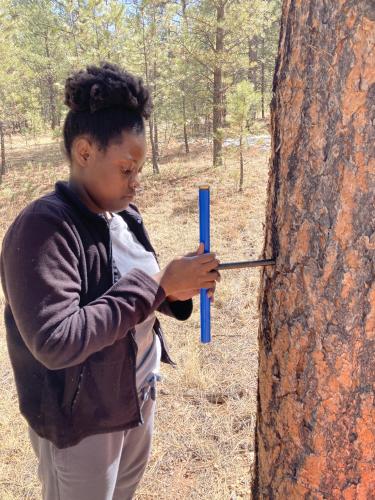INSTAAR’s first cohort of DEI Summer Scholars has been announced. Sáde Cromratie Clemons and Christina Geller will each be awarded a stipend for the summer months to continue their research projects.
The diversity, equity, and inclusion (DEI) scholarships are designed to increase support for students from communities that are historically marginalized in the Earth sciences, and to be concrete commitments toward INSTAAR’s mission of becoming an inclusive and anti-racist institute.
The scholars took the time to answer a few questions about their research and summer plans.
Sáde Clemons (GEOG) will investigate how floods impact forests, and how those impacts play into the carbon cycle
What will you be working on this summer?
“My project focuses on tree response to the 2013 Front Range flood. I look at water use efficiency and wood sourcing using carbon and oxygen isotopes.”
Clemons’ samples come from logjams built by the flood. “I’ve dated all my tree rings already,” she says, “but I’ll be checking that. Then I’ll be cutting them up by each year and extracting cellulose to take back to the lab for isotope analysis.”
Because the environmental conditions of a tree in are recorded in the isotope values of its wood, isotopic analysis can pinpoint how high the tree grew on the mountain slope before it was swept down and into the logjam by the flood. Clemons wants to know, “Where has the wood come from? Riparian areas, or more upslope?”
Clemons’ research will fill in the picture of how floods can affect carbon exchanges in forested areas. “It’s cool to see how this flood has affected this forest, but also how it’s affected the carbon cycle,” she says. “How much did each area contribute to the carbon cycle?”
What will the scholarship enable you to do?
“It definitely helps me when it comes to having samples processed—that costs money. Also it will help me get some lab and field equipment. I could also use the money for conferences.”
What do you like to do when you’re not sciencing?
“I originally hadn’t hiked at all before coming to Colorado. I’ve done a lot more hiking than I’ve ever done in my life!”
Tina Geller (ATOC) is interested in how Arctic estuaries respond to thawing permafrost, with consequences for Arctic ecosystems and food webs
What will you be working on this summer?
“I work with Dr. Julia Moriarty, and I’m implementing a model to look at water circulation, and eventually biogeochemistry, in an Arctic lagoon.”
“Estuaries in general usually have really high productivity, and that means changes in the water can affect food webs and so on. I’m specifically interested in permafrost, and how nutrients released by permafrost thaw can affect the local system. But we don’t know a lot yet about how the water is moving to start to look at that and what’s influencing that.”
“This summer I’m really excited because I’m working on finishing up implementing the model, validating it, and starting to look at a few results.”
What will the scholarship enable you to do?
“Being able to focus on research is great, and the scholarship allows me to do that. But also having the mentality of thinking about [diversity, equity, and inclusion] initiatives on the daily and how I can bring DEI into my research through the interactions I’m going to have this summer with INSTAAR researchers.”
What do you like to do when you’re not sciencing?
“It’s very different than the usual Boulderite. I enjoy video games and doing puzzles. I almost feel like my research is like putting puzzle pieces together to see how they fit into the collective, so there’s a connection there. I’m a huge movie person.”






